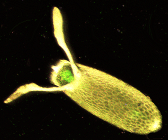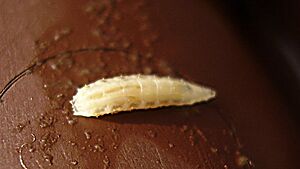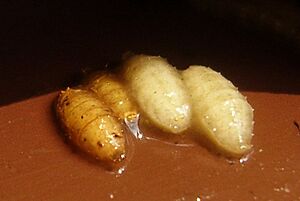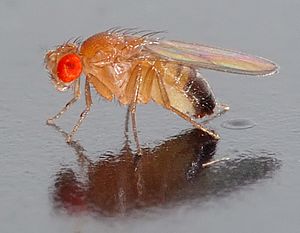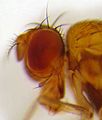Drosophila facts for kids
Quick facts for kids Drosophila |
|
|---|---|
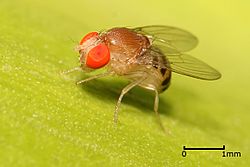 |
|
| Drosophila sp. | |
| Scientific classification | |
| Kingdom: | |
| Phylum: | |
| Class: | |
| Order: | |
| Suborder: |
Brachycera
|
| Family: | |
| Subfamily: | |
| Genus: |
Drosophila
Fallén, 1823
|
Drosophila is a group of small flies. They belong to the family called Drosophilidae. People often call them "fruit flies."
There are more than 1,500 different kinds, or species, of Drosophila flies. Many of them like places where fruit is rotting. Adult flies might eat nectar from flowers. They also lay their eggs on or near decaying fruit. How they do this can be very different from one species to another. The largest number of these species live in the Hawaiian Islands.
One special kind of Drosophila, called D. melanogaster, is very important in science. Scientists use it a lot to study genetics (how traits are passed down). It is also a common "model organism" in developmental biology. This means scientists study it to learn how living things grow and develop.
Contents
Life Cycle of a Fruit Fly
Fruit flies go through several stages in their lives. This is called a life cycle. It includes eggs, larvae, pupae, and adult flies.
How Fruit Flies Reproduce
The number of eggs Drosophila flies lay can be very different. Some species, like D. melanogaster, lay many eggs at once. They can lay 10 to 20 eggs together in one spot. These flies usually breed in large places with lots of food.
Other kinds of fruit flies lay only one egg each day. They might breed in places that are common but have less food, like on leaves.
From Egg to Adult
Fruit fly eggs have tiny tubes called respiratory filaments. These tubes stick out of the egg's surface. They help the embryo inside get oxygen to breathe.
The young flies, called larvae, do not eat plants. Instead, they eat tiny living things like yeasts and microorganisms. These tiny organisms grow on the decaying surfaces of leaves or fruits.
How long it takes for a fruit fly to grow from an egg to an adult can change a lot. It can be anywhere from seven days to over 60 days. This depends on things like the temperature, what they are eating, and how crowded they are.
Images for kids
See also
 In Spanish: Drosophila para niños
In Spanish: Drosophila para niños


